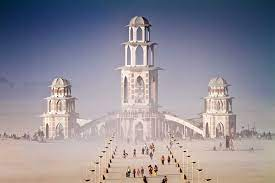Why Shouldn’t it be “Earn to Burn”

By Tonyg, a multi-decade burner and co-creator, www.menagerie.is
The recent challenges surrounding Burning Man ticket distribution highlight broader issues within the event’s organizational and logistical structures. The iconic event, representing self-expression, creativity, and communal spirit, faced recent logistical nightmares. This situation calls for a change, one that decentralizes the power structures and decision-making processes. Converting Burning Man into a Decentralized Autonomous Organization (DAO) could be the solution. Maybe it ought it be:
A year-round gifting economy to recognize BM’s veterans, reduce pay-to-play, grow diversity, and cut on-playa emissions?
Here’s why:
Efficient Resource Allocation: A DAO operates on pre-programmed rules or smart contracts. By converting into a DAO, Burning Man can efficiently distribute resources, such as tickets and grants, based on community decisions, input and value exchange throughout the entire year. This could eliminate situations where theme camps are either over-allocated or under-allocated tickets. Are 100% of the right people with the right mission attending or accessing? How do we measure that?
Transparency and Fairness: DAOs are inherently transparent, as the majority of transactions and decisions are recorded on a blockchain. This transparency ensures fairness in ticket distribution and grant allocation, reducing the chances of any single entity having undue control or influence.
Community-driven Decisions: Decisions in a DAO are typically driven by community votes, which means the participants of Burning Man would have a say in major decisions regarding the event. This could help in creating a system that truly reflects the needs and wants of the community, rather than being subject to the whims of a centralized organization. This is especially true, if the Burning Man DAO ends up choosing a decentralized governance framework akin to what Menagerie.is has built.
Responsive and Dynamic: DAOs can be designed to quickly respond to changing situations. This is especially vital for an event like Burning Man, which, as seen recently, can face volatile ticket demands. A DAO can adjust ticket allocations in real-time, based on data and community inputs, ensuring optimal ticket distribution.
Eradicating Unethical Practices: The recent incident with STEP’s forced ticket selling highlights the problems with centralized systems. In a DAO setup, such decisions would be transparent, with the community having the power to prevent or correct such practices. While STEP is a great start, there is much more to do.
Empowering Theme Camp Organizers: Theme camps are the backbone of Burning Man, creating much of the event’s atmosphere and culture. A DAO would allow these organizers to have a more direct say in ticket distributions, reducing the risk of being left in the dark and scrambling at the last moment.
Dynamism in Community creation and organization: DAO ecosystems, such as Menagerie, allow communities to be self governed as a grassroots community that can start with a mere post on a given topic. Say for example, a burner camp starts a discussion of a certain camp topic that attracts a broader community of people who contribute to the Forum discussion and gain reputation for their forum engagement. Over time, said forum post and the associated discussion can turn into a fully fledged community that grows from the topical discussion in a dynamic evolutionary and organic way.
Financial Stability: DAOs could provide a transparent financial model for Burning Man, ensuring funds are allocated appropriately. This can protect against financial mismanagement, ensuring that the event remains sustainable for years to come.

In conclusion, the recent issues with Burning Man’s ticket distribution are symptoms of larger systemic problems. While the event has grown in scale and complexity, its management structures haven’t evolved to match. Converting Burning Man into a DAO offers a promising solution, aligning with the event’s ethos of community and decentralization. The Burning Man community should embrace this new structure, staying true to its roots while adapting to the modern world.
Maybe they should look at www.menagerie.is
Menagerie empowers your community with a platform for community governance that allows groups to gather together, raise and spend money, create and vote on proposals, and take actions that affect your community.
The Menagerie platform includes a suite of tools that allow a community to:
- Align community members toward collective goals.
- Establish, track, and reward the reputation and contributions of community members.
- Pay for, buy, and invest in products and services.
- Hire Contractors, managers, and contributors.
- Fund Internal and external projects and proposals.
- Reward those who made meaningful contributions.
- Help individuals everywhere prosper instead of focusing only on the desires of a few large shareholders.

